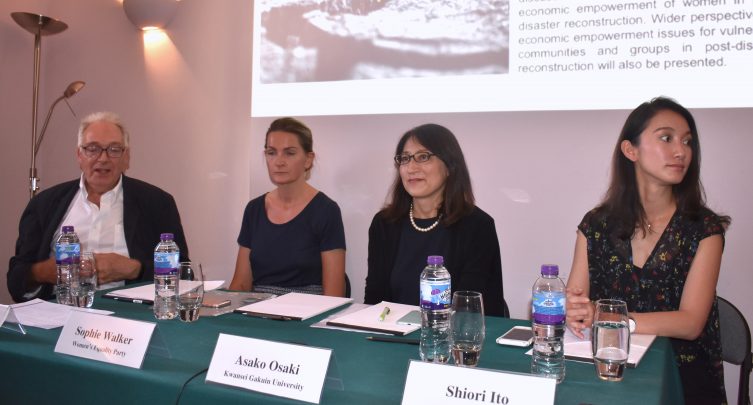 Annual Seminar Series Seminar
Annual Seminar Series SeminarTuesday 26 June 2018
6:00pm – 7:30pm
New Approaches: #MeToo in Japan and the UK
Drinks reception: 7:30pm – 8:00pm
13/14 Cornwall Terrace, Outer Circle (entrance facing Regent's Park), London NW1 4QP
Organised by the Daiwa Anglo-Japanese Foundation
Fully bookedThe #MeToo movement swiftly spread from America to the UK in October 2017, with thousands of women sharing their stories of sexual abuse or misconduct on social media. The movement’s impact spread beyond the internet, with prominent examples including allegations of sexual misconduct levelled at government figures, leading to the resignation of UK Defence Secretary Sir Michael Fallon, accusations of misconduct within the aid industry, and the President’s Club scandal.
Although initially slower to take off, the #MeToo movement has also gained momentum in Japan. The movement has given women a platform enabling their voices to be heard, leading to more women speaking out about sexual misconduct. As in the UK, members of the government have been implicated, most notably with the resignation of Junichi Fukuda, the top bureaucrat at the Ministry of Finance, after he was accused of sexual harassment by a journalist.
In this seminar, the impact of #MeToo was discussed in relation to the UK and Japan. The speakers outlined the implications and effects that the movement has had across each society and the extent to which it may impact government policies and legislation, as well as the challenges that the movement faces.
A written summary of two of the presentations can be found via the button below:
Written summary, PDF
Japan’s Secret Shame, the story of Shiori Ito, who shocked Japan with a public allegation of rape in a country where sex crimes are rarely discussed, can be seen on BBC Iplayer until 2 August 2018:
Secret Shame, Shiori ItoA video of the seminar can be found here:
About the contributors
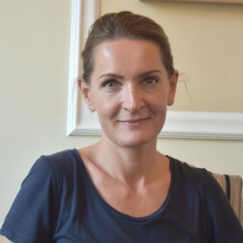
Sophie Walker
Sophie Walker is Leader of the Women’s Equality Party, Britain’s first feminist political party which campaigns for women’s rights. In 2016 she ran for London Mayor on a manifesto to close the city’s 23% pay gap and lack of affordable childcare, winning 1 in every 20 votes cast. In 2017 she contested the seat of the ‘men’s rights activist’ MP Philip Davies after he filibustered a bill to end violence against women and girls, and helped to halve his constituency majority. Sophie recently won 90% of the vote in the Party’s first leadership election. Previously a Reuters correspondent for 20 years, Sophie came to politics via disability campaigning and activism and is an ambassador for the National Autistic Society and for IncludeMEtoo.
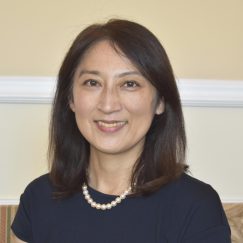
Asako Osaki
Asako Osaki, Visiting Professor at Kwansei Gakuin University, School of Policy Studies, is a specialist in gender issues. She began her career at the United Nations Development Programme, focusing on the promotion of gender equality and women’s empowerment. Since returning to Tokyo, she has been active in mainstreaming gender in Japan’s development assistance policies and programmes, as well as in addressing domestic gender issues such as poverty and violence, working with the Government, NGOs and research institutions. At the APEC Women and Economy forum 2014, Osaki presented on the “Economic Empowerment of Women in the Post-Disaster Reconstruction Process”. She also participated in the 2016 W20 (G20 Women’s Forum) as part of the Government of Japan’s official delegation.
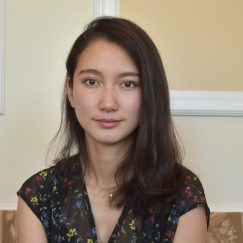
Shiori Ito
Shiori Ito is a freelance journalist, documentary film-maker and author of Black Box (2017). Her work is mainly distributed overseas, and has been shown on international media outlets such as Al Jazeera and Reuters. At the 2018 New York Festivals, an international media competition, Ito won two silver medals in the Social Issues and Sports Documentary categories. She also won the 7th Free Press Association Award Grand Prize in Japan for Black Box. This book is about her own investigation and experience of Japan’s sexual violence situation. Ito is currently working on a BBC documentary about sexual violence in Japan, Japan’s Secret Shame.
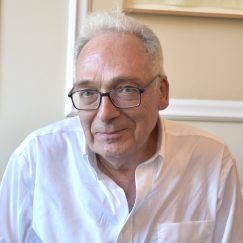
Dan Damon
Dan Damon (Chair) is a BBC journalist and radio broadcaster who presents World Update for the BBC World Service. Damon joined the BBC in 1974 as a technical operator for radio news. His move into journalism took place in 1982 with a nightly phone-in on LBC. In 1988, he moved to Hungary with his camerawoman wife, Siân, to report on liberation and street protest in East Germany, Czechoslovakia, Romania, Albania and the former Soviet Union. Damon also reported from conflicts in Croatia and Bosnia, Baghdad during the first Gulf War, and Afghanistan. He then returned to the BBC in 1995 to work as a presenter and reporter for the BBC World Service and BBC Radio 4. In 2003 Damon became the main presenter of World Update on the BBC World Service.